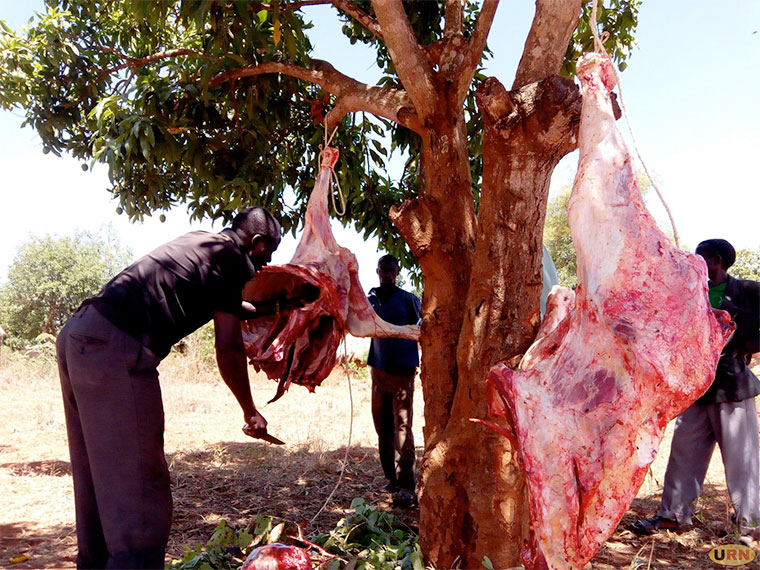Meat prices fall to Shs 1,000 as dry spell hits Nakasongola

The price of meat has drastically fallen in Nakasongola district as scores of cattle continue to die on a daily basis due to lack of water and pasture. A kilogram of meat now costs a paltry Shs 1,000, down from Shs 10,000 while a cow goes for as low as Shs 50,000.
Samuel Kasirye, the prime minister of Buruuli chiefdom explains that the valley dams constructed by both the district and private farmers dried up in August 2018, leaving pastoralists desperate, with no water to sustain their animals.
Kasirye adds that the rains expected in early March did not come, forcing herdsmen to trek long distances for water and pasture. He says that because of the long distances, animal collapse along the way and die.
“Animals are dying everyday and each animal is costing between Shs 20,000 and Shs 30,000 because once it cannot move, then the owner has to sell it off.” said Kasirye.
The most affected pastoralists are from the sub-counties of Nabiswera, Lwabyata, Kalungi, and Wabinyonyi. Joseph Muruli, a pastoralist at Kawondwe village, Kalungi sub-county says he has lost over 10 head of cattle so far. He adds that he now spends between Shs 70,000 and Shs 200,000 per day to fuel a truck to fetch water from a distant valley dam to enable other cattle to survive.
Godfrey Byekwaso, a cattle trader in Nakasongola says that he now buys each cow at between Shs 50,000 and Shs 100,000. He says because of the high supply, they now sell a kilo of meat at Shs 1,000 within the community in Nakasongola.
Fred Kasumba, a tax collector at Kansirye cattle market says that because of the dry spell, few cattle is now able to reach the market. He says the market used to attract over 300 head of cattle but currently they are only 100 head of cattle which are also in bad shape.
Wabbale valley dam located on the outskirts of Nakasongola town is the only available water source serving over 700 head of cattle per day from Nakasongola town, Wabinyonyi and Nabiswera among sub-counties. There are fears that it may equally dry up due to the high water consumption.
Eva Najja, a resident of Wabbale village says that they are worried that if rains don’t fall soon, people may also start dying because they compete with animals for water at valley dam. Pastoralists and residents have asked the government to invest in water for production.
There over 264,000 head of cattle in Nakasongola district. But, at least 500 of them are lost during the dry spell each year according to district veterinary office estimates. According to a statement from the Uganda National Meteorological Authority (UNMA) the dry spell conditions are expected to prevail over most parts of the country until late March 2019.
The Authority boss, Dr Festus Luboyera said in a March 12 statement said that the current dry spell is a result of the tropical cyclone (storm) named ‘IDAI’, which has been over Mozambique and Madagascar. He observes that this tropical cyclone led to the development of a low-pressure system around the Mozambique Channel, which resulted into the weakening of the Southeasterly trade winds in mid-march.
“These winds became diverted towards the channel, depriving moisture-laden winds to reach our country, which is why we have experienced dry spells that have disrupted the onset of March to May seasonal rainfall,” Luboyera said.
Doctor Sam Eswaggu, the Nakasongola district veterinary officer and Sam Kigula the LC V chairman of Nakasongola said they were outside the district and unable to comment on the issue. However, Eswaggu has been quoted previously saying that the problem has been worsened by the fact that some pastoralists have overstocked animals yet they have meagre resources to look after them.

























